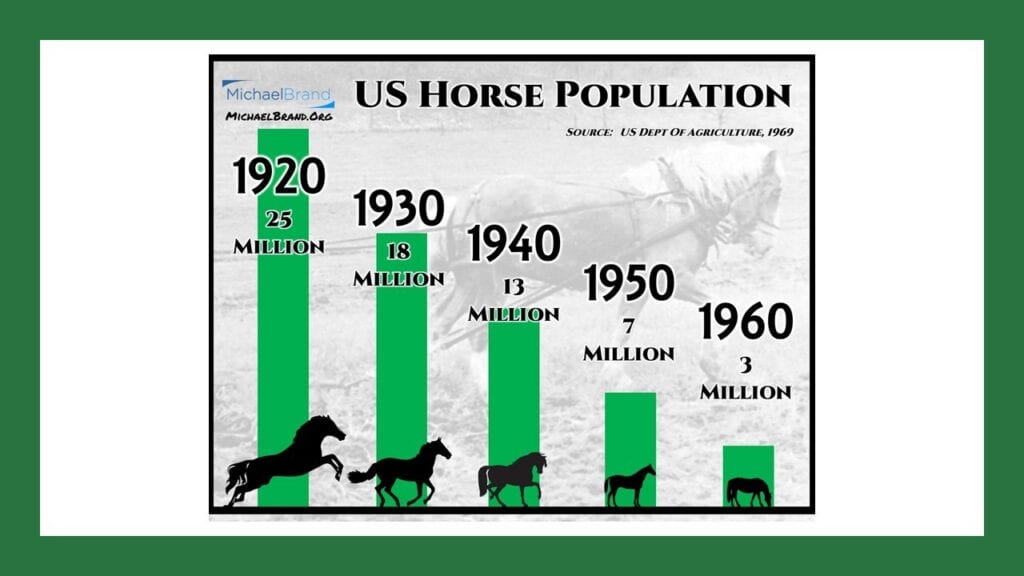Just as the horse had no comprehension it was being rendered useless, some employees may refuse to acknowledge they’re headed towards irrelevancy.
Consider the horse. Until the dawn of the 20th century, a horse was one of the most valuable assets a person had. It provided transportation and power as well as a means of exchange (in the old west, the punishment for property crime was frequently for the perp to hand over a specified number of horses to the victim).

Then the world changed.
Carol is a grocery clerk in her mid-50s. It’s her encore career. Her first vocation was 20+ years in a law firm before digital databases rendered her legal research skills obsolete. “When my firm laid me off, I didn’t worry”, she said over coffee in the store’s café. “I mean, I knew people like me were no longer needed in law firms but thought my skills would easily transfer to any number of admin positions.”
After a couple of low-paying, no benefit jobs with local nonprofits, Carol finally managed to hook on with the food chain. “The money is no better, but it’s union so the benefits help a lot”.
Yet she knows the likelihood of being replaced once more. Self-scanners were introduced last year and everyone understands the store of the future will require far fewer employees. “If I can hang on until 62, I’ll be alright with early Social Security.” “If”, she quietly repeats.
Her world had changed.
FOBO – Fear Of Being Obsolete. The present-day apprehension of being left behind by the accelerating pace of technological and economic change.
Multiple research sources indicate employees worry most that their skills will no longer be needed in the modern economy. This worry extends from the front lines all the way to the executive suite.
This anxiety is understandable. Over the past two decades we’ve witnessed one industry after another wither away under the fierce disruption of digital innovation – music, newspapers, taxis.
There is much talk of retraining. Learn To Code they snarkily suggest. But to survive and thrive in the coming economy, what people need most is not a new set of skills but a new way of thinking. They need new mental models.
Death Of An Industry
Mental Models are how we make sense of the world. The concept, popularized by business author Peter Senge in the 1990s, describes how we program ourselves to view how things work in real life and what subsequent outcomes we can expect. For example, a mental model might be that a college degree is a ticket to the middle class. Or that thru hard work and playing by the rules you can achieve a secure life.
At the outbreak of the First World War, Great Britain had the finest horse cavalry in the world. Their horseman held a high place of honor in British society….their tales legion. As the war commenced there was no reason for British war planners to doubt that these magnificent equine warriors would continue their tradition of achieving sweeping breakthroughs of enemy lines.
The results, however, were tragic; 5,674 dead and 14,630 wounded. Machine guns, barbed wire and high-explosive artillery rendered the commander’s mental model obsolete.
Their world had changed
Obsolete Thinking

The fear of our mental models becoming obsolete is warranted. But note, it’s our thinking which is obsolete, not us….not our talents, not our abilities.
We are in the midst of an economic revolution every bit as disruptive as the age of the internal combustion engine. These revolutions have a way of messing with people’s mental models. Normally, people who try to envision extreme futures are perceived as somewhat out-there dreamers with their heads in the clouds. But in times of uncertainty, people reach out to these dreamers as saviors in the hope someone can help them make sense of the future.
And back to the horse.
Creative Destruction is the process who the old is swept aside in favor of that which is more efficient and/or effective.
It took just 40 years for the horse to go from being an essential element of the economy to being an afterthought (see chart). Of course, the horse had no comprehension it was being rendered useless, just as many employees refuse to acknowledge they may be on the road to irrelevancy.
The pathway to sustainability lies in awareness and acceptance. To understand that uncertainty is the new norm. To acknowledge that all your loyalty and hard work from the past counts for little in the future. To look deeply at your own work to ask, “Can this be done by machine?”
Otherwise, you risk becoming a horse of the 21st century.
Are you at risk? Schedule a free 15 minute with me to get clarity about what your future prospects are:
